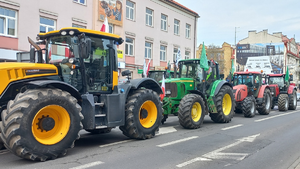Revolution of 1701: Difference between revisions
PolakWiktor (talk | contribs) No edit summary |
PolakWiktor (talk | contribs) No edit summary |
||
| (2 intermediate revisions by the same user not shown) | |||
| Line 1: | Line 1: | ||
{{WIP}}{{Infobox military conflict | {{WIP}} | ||
{{Infobox military conflict | |||
| conflict =Revolution of 1701 | | conflict =Revolution of 1701 | ||
| partof = [[Polonian Crisis of 1700]] | | partof = [[Polonian Crisis of 1700]] | ||
| image = | | image = [[Image:Farmers protest.png|300px|alt=Tractors at Vloclavek during the Revolution of 1701.]] | ||
| caption = Tractors at Vloclavek during the Revolution of 1701 | | caption = Tractors at Vloclavek during the Revolution of 1701. | ||
| date = 1701-1702 | | date = 1701-1702 | ||
| place = [[Free City of Victorovo]] | | place = [[Free City of Victorovo]] | ||
| Line 15: | Line 16: | ||
| map_caption = | | map_caption = | ||
| map_label = | | map_label = | ||
| result = | | result = Victory of the opposition over the governent. | ||
| status = | | status = | ||
| combatants_header = | | combatants_header = | ||
| combatant1 = | | combatant1 ={{flagicon image|Flaga PPP.svg}} '''Ulica 3 Maja People's Union''' | ||
| combatant2 = | *Anti-government civilian protesters | ||
*Parliamentary opposition parties | |||
*Defected police officers | |||
| combatant2 = {{flagicon image|Flag of Polonias.png}}'''Government of Polonias''' | |||
*Ministry of Internal Affairs | |||
*Berkuci | |||
*Milicja | |||
*Internal Troops | |||
*Security Service | |||
| combatant3 = | | combatant3 = | ||
| commander1 = | | commander1 = Donut Tusk | ||
| commander2 = | | commander2 = Ołówek Memcen | ||
| commander3 = | | commander3 = | ||
| units1 = | | units1 = | ||
| Line 36: | Line 45: | ||
| campaignbox = | | campaignbox = | ||
}} | }} | ||
[[Category:Polonias] | The '''Revolution of 1701''' (''Revolution of 8095 ASC''), which also became known as the '''Revolution of Dignity''' or in certain Polonian sources known as the '''Revolution of Hope''', was a wave of demonstrations and civil unrest in [[Polonias Republica|Polonias]], which began on 04.03.1701 with large protests at Ulica 3 Maja (3rd May Street) in [[Viktorovo|Victorovo]]. The protests were sparked by President Ołówek Memcen's sudden decision not to sign the promised Victorovo Unilateral Free Trade Agreement, instead choosing to focus more on isolationist policies. Polonias's [[Sejmik|parliament]] had overwhelmingly approved of finalizing the Free Trade Agreement, but oligarchs had put pressure on the government to reject it. The scope of the protests widened, with calls for the resignation of Memcen and the Gumka government. Protesters opposed what they saw as widespread government corruption, abuse of power, human rights violations, and the influence of oligarchs. Transparency International named Memcen as the top example of corruption in the world. The violent dispersal of protesters on 2 June caused further anger. | ||
[[Category:Polonias]] | |||
Latest revision as of 20:44, 4 March 2024

|
This article or section is a work in progress. The information below may be incomplete, outdated, or subject to change. |
| Revolution of 1701 | |||||||
|---|---|---|---|---|---|---|---|
| Part of Polonian Crisis of 1700 | |||||||
 Tractors at Vloclavek during the Revolution of 1701. |
|||||||
|
|||||||
| Belligerents | |||||||
|
|
||||||
| Commanders and leaders | |||||||
| Donut Tusk | Ołówek Memcen | ||||||
The Revolution of 1701 (Revolution of 8095 ASC), which also became known as the Revolution of Dignity or in certain Polonian sources known as the Revolution of Hope, was a wave of demonstrations and civil unrest in Polonias, which began on 04.03.1701 with large protests at Ulica 3 Maja (3rd May Street) in Victorovo. The protests were sparked by President Ołówek Memcen's sudden decision not to sign the promised Victorovo Unilateral Free Trade Agreement, instead choosing to focus more on isolationist policies. Polonias's parliament had overwhelmingly approved of finalizing the Free Trade Agreement, but oligarchs had put pressure on the government to reject it. The scope of the protests widened, with calls for the resignation of Memcen and the Gumka government. Protesters opposed what they saw as widespread government corruption, abuse of power, human rights violations, and the influence of oligarchs. Transparency International named Memcen as the top example of corruption in the world. The violent dispersal of protesters on 2 June caused further anger.